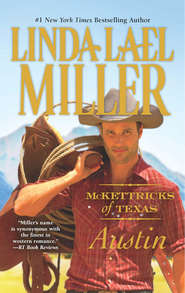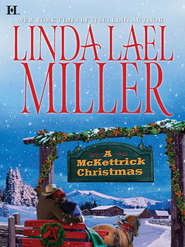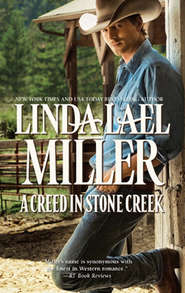По всем вопросам обращайтесь на: info@litportal.ru
(©) 2003-2024.
✖
Part of the Bargain
Автор
Год написания книги
2018
Настройки чтения
Размер шрифта
Высота строк
Поля
“You stay right here on this ranch, Libby Kincaid,” Marion Bradshaw rushed on, her own face flushed now. “Don’t let Stacey or anybody else run you off.”
That morning’s unfortunate scene in Ken’s kitchen was an indication of how difficult it would be to take the housekeeper’s advice. Life on the Circle Bar B could become untenable if both Stacey and Jess didn’t back off.
“I’ll try,” she said softly before stepping down off the porch and making her way around the side of that imposing but gracious house.
Prudently, the stables had been built a good distance away. During the walk, Libby wondered if she shouldn’t leave the ranch after all. True, she needed to be there, but Jonathan’s death had taught her that sometimes a person had to put her own desires aside for the good of other people.
But would leaving help, in the final analysis? Suppose Stacey did follow her, as he’d threatened to do? What would that do to Cathy?
The stables, like the house, were constructed of red brick. As Libby approached them, she saw Cathy leading two horses out into the sun—a dancing palomino gelding and the considerably less prepossessing pinto mare that had always been Libby’s to ride.
Libby hesitated; it had been a long, long time since she’d ridden a horse, and the look in Cathy’s eyes was cool. Distant. It was almost as though Libby were a troublesome stranger rather than her cousin and confidante.
As if to break the spell, Cathy lifted one foot to the stirrup of the Palomino’s saddle and swung onto its back. Though she gave no sign of greeting, her eyes bade Libby to follow suit.
The elderly pinto was gracious while Libby struggled into the saddle and took the reins in slightly shaky hands. A moment later they were off across the open pastureland behind the stables, Cathy confident in the lead.
Libby jostled and jolted in the now unfamiliar saddle, and she felt a fleeting annoyance with Cathy for setting the brisk pace that she did. Again she berated herself for being angry with someone who couldn’t hear.
Cathy rode faster and faster, stopping only when she reached the trees that trimmed the base of a wooded hill. There she turned in the saddle and flung a look back at the disgruntled Libby.
“You’re out of practice,” she said clearly, though her voice had the slurred meter of those who have not heard another person speak in years.
Libby, red-faced and damp with perspiration, was not surprised that Cathy had spoken aloud. She had learned to talk before the childhood illness that had made her deaf, and when she could be certain that no one else would overhear, she often spoke. It was a secret the two women kept religiously.
“Thanks a lot!” snapped Libby.
Deftly Cathy swung one trim blue-jeaned leg over the neck of her golden gelding and slid to the ground. The fancy bridle jingled musically as the animal bent its great head to graze on the spring grass. “We’ve got to talk, Libby.”
Libby jumped from the pinto’s back and the action engendered a piercing ache in the balls of her feet. “You’ve got that right!” she flared, forgetting for the moment her earlier resolve to respect Cathy’s affliction. “Were you trying to get me killed?”
Watching Libby’s lips, Cathy grinned. “Killed?” she echoed in her slow, toneless voice. “You’re my cousin. That’s important, isn’t it? That we’re cousins, I mean?”
Libby sighed. “Of course it’s important.”
“It implies a certain loyalty, don’t you think?”
Libby braced herself. She’d known this confrontation was coming, of course, but that didn’t mean she wanted it or was ready for it. “Yes,” she said somewhat lamely.
“Are you having an affair with my husband?”
“No!”
“Do you want to?”
“What the hell kind of person do you think I am, Cathy?” shouted Libby, losing all restraint, flinging her arms out wide and startling the horses, who nickered and danced and tossed their heads.
“I’m trying to find that out,” said Cathy in measured and droning words. Not once since the conversation began had her eyes left Libby’s mouth.
“You already know,” retorted her cousin.
For the first time, Cathy looked ashamed. But there was uncertainty in her expression, too, along with a great deal of pain. “It’s no secret that Stacey wants you, Libby. I’ve been holding my breath ever since you decided to come back, waiting for him to leave me.”
“Whatever problems you and Stacey have, Cathy, I didn’t start them.”
“What about all his visits to New York?”
Libby’s shoulders slumped, and she allowed herself to sink to the fragrant spring-scented ground, where she sat cross-legged, her head down. With her hands she said, “You knew about the divorce, and about Jonathan. Stacey was only trying to help me through—we weren’t lovers.”
The lush grass moved as Cathy sat down too, facing Libby. There were tears shining in her large green eyes, and her lower lip trembled. Nervously she plied a blade of grass between her fingers.
“I’m sorry about your little boy,” she said aloud.
Libby reached out, calmer now, and squeezed Cathy’s hands with her own. “Thanks.”
A lonely, haunted look rose in Cathy’s eyes. “Stacey wanted us to have a baby,” she confided.
“Why didn’t you?”
Sudden color stained Cathy’s lovely cheeks. “I’m deaf!” she cried defensively.
Libby released her cousin’s hands to sign, “So what? Lots of deaf people have babies.”
“Not me!” Cathy signaled back with spirited despair. “I wouldn’t know when it cried!”
Libby spoke slowly, her hands falling back to her lap. “Cathy, there are solutions for that sort of problem. There are trained dogs, electronic devices—”
“Trained dogs!” scoffed Cathy, but there was more anguish in her face than anger. “What kind of woman needs a dog to help her raise her own baby?”
“A deaf woman,” Libby answered firmly. “Besides, if you don’t want a dog around, you could hire a nurse.”
“No!”
Libby was taken aback. “Why not?” she signed after a few moments.
Cathy clearly had no intention of answering. She bolted to her feet and was back in the palomino’s saddle before Libby could even rise from the ground.
After that, they rode without communicating at all. Knowing that things were far from settled between herself and her cousin, Libby tried to concentrate on the scenery. A shadow moved across the sun, however, and a feeling of impending disaster unfolded inside her.
Jess glared at the screen of the small computer his father placed so much store in and resisted a caveman urge to strike its side with his fist.
“Here,” purred a soft feminine voice, and Monica Summers, the senator’s curvaceous assistant, reached down to move the mouse and tap the keyboard in a few strategic places.
Instantly the profit-and-loss statement Jess had been trying to call up was prominently displayed on the screen.
“How did you do that?”
Monica smiled her sultry smile and pulled up a chair to sit down beside Jess. “It’s a simple matter of command,” she said, and somehow the words sounded wildly suggestive.











